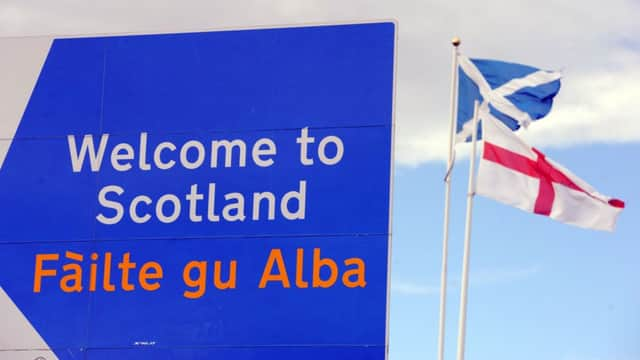Splitting will be a matter of boundaries


THE process of nations choosing different directions can be as easy or as difficult as couples choosing to separate or divorce – much depends on the attitudes and objectives of those involved in the decisions to be made. Yet a quick online search of the words “Scottish referendum divorce” throws up very little on the effect of a “yes” vote on family law proceedings.
So in the event of an independent nation, where do separated, separating or divorcing couples in Scotland stand? The simple answer is more or less where they already are, unless one or both of them have already moved away – because family law in Scotland is already devolved.
Advertisement
Hide AdAdvertisement
Hide AdDivorce laws are different in England and Scotland. That being so, a couple who do not like the outcome of the referendum and decide to move either north or south of the Border will be impacted by the jurisdiction of divorce where they reside.
In the event of a Yes vote, we could see divorce actions being raised to secure jurisdiction in courts of a particular country. Certain conditions need to be met before a court will consider and deal with a divorce action, one of them being that the action needs to have been raised in the right place. Whether a court has jurisdiction is largely based on habitual residence in that country for a period, failing which the court can consider the domicile of both spouses. On every occasion, whether the action has been raised in the right place needs to be considered carefully.
For some time, we have had well-settled divorce principles in Scotland and a body of case law to complement our legislation. Scottish legislation has functioned relatively well in the context of the remainder of the UK (rUK) and vice-versa, a recent example being the English Marriage (Same Sex Couples) Act 2013.
Scotland’s own Marriage and Civil Partnership (Scotland) Act 2014, not yet in force, will bring mirroring provisions to Scotland, but while we wait for this, the 2013 Act provides for the recognition of same sex marriages conducted in England and Wales as civil partnerships in Scotland.
One area where we might see change in the event of a Yes vote is child support (payment by a non-resident parent to the other parent for care of a child) which would come within the legislative competence of the Scottish Parliament. It might be necessary to develop new mechanisms to deal with recovery of unpaid child maintenance from a parent resident in rUK– a regulatory change.
One question for divorce lawyers is whether an independent Scotland will be accepted by the EU, ensuring key international obligations remain legally binding on an independent Scotland. This is important when considering reciprocal agreements already in place, such as those regulating the return of children considered as having been abducted between signatory countries.
Like the EU membership question, this is not a straightforward area of law and one which could be discussed at length, but the Convention on the Civil Aspects of International Child Abduction (1980) (the Hague Convention) is the means to securing the return of children removed or kept away from the state of their habitual residence in breach of a “right of custody”.
Some commentators say Scotland could see an influx of parents who have abducted children if it is not signed up to the Hague Convention on 17 September, 2014, although it is the 1985 Act which actually applies the Hague Convention to the UK and this will continue to apply in Scotland whatever the referendum result.
Advertisement
Hide AdAdvertisement
Hide AdWhat can be said, in balance, is that International treaties are of great standing in the Scottish and European legal systems and it would be difficult to imagine a situation in which the effect and application of the principles and rules would not continue to be applied between courts in Scotland, rUK and outwith in future. However, formal agreements would have to be regularised in the event of a Yes vote and pending the outcome of the EU membership issue.
Council Regulation (EC) 2201/2003 Brussels II bis applies to all EU member states except Denmark. It governs matters of jurisdiction relating to divorce, legal separation, nullity of marriage, parental responsibility of children and the recognition of judgments in matrimonial matters and matters of parental responsibility. Unlike the Hague Convention, Brussels II bis is directly applicable in the UK, but the question remains as to how Scotland will become a member state of the EU. Practicality and common sense may dictate that Scotland would apply Brussels II bis and citizens would continue to benefit from its protections in any event.
While some are inclined to present a Yes vote as the starting-gun for a re-enactment of the war between the Roses, the reality for family law is likely to be far less compelling, with technical changes the order of the day.
• Jennifer Wilkie is a family law associate and member of Anderson Strathern’s independence referendum advice team www.andersonstrathern.co.uk/indyref
SEE ALSO